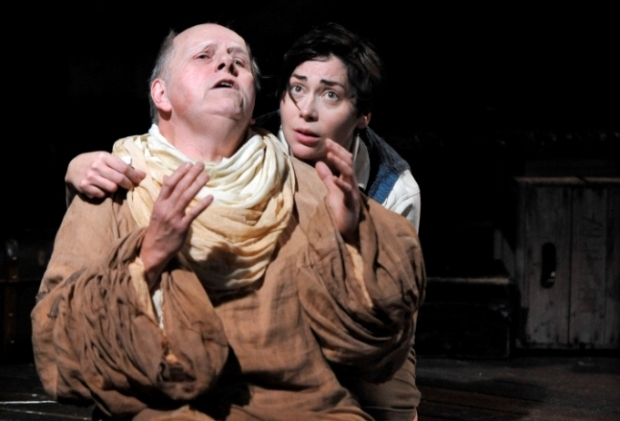Review: Simplicius Simplicissimus (The Lilian Baylis Theatre)

© Robbie Jack
Not a title to say with a mouth full of beans, and not an opera to stage when Lulu‘s in town, Simplicius Simplicissimus is a picaresque pageant that flatters to deceive. It depicts battle atrocities (notionally the 30 Years War, although it could be any conflict) through the eyes of an ill-educated lad with a talent for extempore speechifying.
Karl Amadeus Hartmann was a Weimar composer whose rise to prominence was cut short by the march of Nazism, and Simplicius—composed in the late forties and revised in 1957—can be seen as the confession of a guilt-plagued bystander who, although he did not physically flee wartime Germany, had reacted to events by adopting a creative purdah.
The opera’s music is more arresting than it is original and its libretto (by the composer and Hermann Scherchen) sorely needs a dramaturg. The pair opted to set only three episodes from Hans von Grimmelshausen’s 1668 novel of the same name, and the resultant lack of progressive impact neutralises their dramatic potential. Even Hartmann’s contemporary Bertolt Brecht, whose tropes are never far from the surface here, understood the need for a taut through line.
All power to the enterprising Independent Opera for giving the work its UK premiere, and for sparing no expense along the way. There is so much that’s good about a performance whose scale and ambition make the Lilian Baylis Studio burst at the seams, from David Pountney‘s fine vernacular translation through the scorching performance of Stephanie Corley in the title role to the virtuosic playing of the Britten Sinfonia under Timothy Redmond. The latter make a powerful case from Hartmann’s chamber score, projecting it with a swashbuckling bravura that almost masks the music’s derivative voice.
A blue-ribbon cast includes William Dazeley as a soldier whose morals have been brutalised by war, Adrian Thompson as the hermit who instructs Simplicius, and Mark Le Brocq as the sinister Governor whom he subsequently entertains.
'Corley's vigorous, boyishly convincing performance'
The ear-pleasing modernity of Hartmann’s writing folds dissonance into assonance then out again, characteristically leavening the melodic material with pastiche allusions. Quotations from A Soldier’s Tale and Borodin’s Polovtsian Dances are pertinent, but their appearance deflects attention from the action. String writing is lyrical though rarely beautiful, which feels right; brass, woodwind and percussion smack of Stravinsky, which doesn’t.
Setting aside their respective artistic merits, both Simplicius Simplicissimus and Berg’s Lulu have protagonists who are innocents around whom events revolve. The difference is that dreadful things happen to Lulu whereas they happen despite Simplicius. He is a yawning hole in his own opera, which makes Corley’s vigorous, boyishly convincing performance all the more remarkable. She almost survives Polly Graham‘s misguided production.
The young director has chosen to locate Hartmann’s opera neither in the world it depicts nor in an abstract setting but in an attic (spectacularly well designed by Nate Gibson), with Simplicius a bespectacled bookworm whose imagination is ignited by reading history books. Is this an Anne Frank reference? It isn’t followed through, so probably not. Rather, Corley resembles the hero of The NeverEnding Story whose fantasies spring to life amid the crates and trunks.
War has little power to shock when we’re this far removed from reality, and not even the graphic violation of a woman by a brigade of soldiers is able to hit home. Graham’s indoor concept is so limiting that whatever horrors infect the tale, her production remains aseptic and safe.
There are further performances of Simplicius Simplicissimus on 17 and 19 November.










